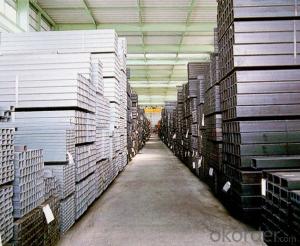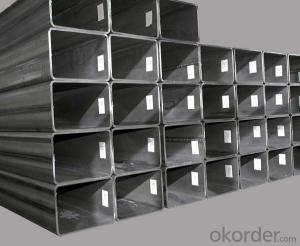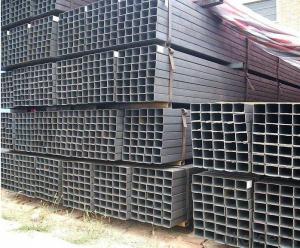Hollow Section-Square Pipes With Lowest price
- Loading Port:
- Tianjin
- Payment Terms:
- TT OR LC
- Min Order Qty:
- 25 m.t.
- Supply Capability:
- 10000 m.t./month
OKorder Service Pledge
OKorder Financial Service
You Might Also Like
Carbon ERW Welded Pipes-Square Tube And Pipe For Furniture ASTM A53 Hollow Section Details:
| Minimum Order Quantity: | 50MT | Unit: | m.t. | Loading Port: | China Main Port |
| Supply Ability: | based on order | Payment Terms: | TT or L/C |
Product Description:
1. Specification of ERW Welded Pipes-Square Tube and Pipe for Furniture ASTM A53 Hollow Section
1) Application: Greenhouse pipes, scaffolding pipes, transportation the ocean oil and gas, mechanical tube of ocean platform, power station, chemical industry and building, construction foundation piles, steel structure building, for low-pressur fluid service, steel structure bridges etc.
2) Standard: ASTM A53, BS1387, GB/T9711, GB/T39013
3) Steel Grade: Q195/Q215/Q235/Q345
2. Sizes of ERW Welded Pipe- Square Tube and Pipe for Furniture ASTM A53 Hollow Section
Outer Diameter: 1/2"x1/2"-16"x16''
Thickness:4.0-12.75mm
Length: As costumer's requirement
2. Packing & Delivery
Packing Detail: Packing in bundle with steel strips;with seaworthy package at the end; could be done with your requirement
Delivery Time: Within 30 Days after the reception of prepayment or L/C
3. Data Sheet
Standard: ASTM A53
Mechanical Properties
Standard | Grade | (MPa) | (MPa) |
Yield strength | Tensile Strength | ||
ASTM A53M | A | 205 | 330 |
B | 240 | 415 |
Chemical Composition(%)
Standard | Grade | C | Mn | P | S | V | Ni | Cu | Cr | Mo |
Max | Max | Max | Max | Max | Max | Max | Max | Max | ||
ASTM A53M | A | 0.25 | 0.95 | 0.05 | 0.045 | 0.08 | 0.4 | 0.5 | 0.4 | 0.15 |
B | 0.30 | 1.20 | 0.05 | 0.045 | 0.08 | 0.4 | 0.5 | 0.4 | 0.15 |
- Q:Are steel pipes resistant to fire?
- Yes, steel pipes are generally highly resistant to fire due to their inherent fire-resistant properties.
- Q:What are the different coating materials used for steel pipes?
- Some common coating materials used for steel pipes include epoxy, polyethylene, polyurethane, and coal tar enamel. These coatings are applied to protect the steel from corrosion and provide a barrier against environmental elements.
- Q:What are the industries that commonly use steel pipes?
- Some of the industries that commonly use steel pipes include oil and gas, construction, manufacturing, automotive, infrastructure, water treatment, and plumbing.
- Q:How are steel pipes classified based on their wall thickness?
- Steel pipes are classified based on their wall thickness into three categories: standard weight, extra-strong, and double extra-strong.
- Q:Are steel pipes suitable for underground mining applications?
- Steel pipes are a great choice for underground mining. The mining industry has been using steel pipes for a long time, and they have many different uses, such as supplying water, providing ventilation, and moving materials. Steel pipes are strong and durable, making them perfect for the tough conditions of underground mining. One of the reasons steel pipes are so good for underground mining is their high tensile strength. This means they can handle the pressure and stress from the rock and earth around them. They can also carry heavy loads, which is important for transporting materials and supporting structures in mining tunnels. Another advantage of steel pipes is their resistance to corrosion. This is really important in underground mining, where there's often moisture and chemicals around. With steel pipes, you don't have to worry about them getting damaged and needing to be replaced or repaired all the time. Steel pipes are also easy to weld and join together. This means they can be customized to fit different shapes and sizes to suit the specific needs of each mining operation. To sum up, steel pipes are a fantastic choice for underground mining because they're strong, durable, resistant to corrosion, and versatile. They've been proven to be effective in supporting mining operations and ensuring safety and efficiency.
- Q:What are the properties of steel that make it suitable for pipe manufacturing?
- Due to its unique properties, steel is highly favored as a material for manufacturing pipes. The exceptional strength and durability of steel allow it to withstand high pressure and extreme temperatures, ensuring the safe transportation of fluids and gases over long distances without the risk of leakage or breakage. Another significant advantage of steel is its resistance to corrosion. Unlike other materials that can degrade when exposed to corrosive substances such as water, chemicals, and gases, steel remains highly resistant to corrosion. This quality makes steel pipes long-lasting and reliable. Furthermore, steel is a versatile material that allows for the production of pipes in various sizes and shapes. This flexibility enables customization to meet specific project requirements, making steel pipes suitable for a wide range of applications, including water supply, oil and gas transmission, sewage systems, and structural support. Moreover, steel possesses excellent thermal conductivity, which is crucial for applications involving the transportation of hot or cold fluids. Steel pipes efficiently transfer heat, ensuring minimal energy loss during the process. Additionally, steel is an environmentally friendly option for pipe manufacturing due to its recyclability. Steel pipes can be recycled and reused, reducing the demand for new raw materials and minimizing waste generation. In conclusion, the properties of strength, durability, corrosion resistance, versatility, thermal conductivity, and recyclability make steel the ideal choice for pipe manufacturing. These properties guarantee the reliability, efficiency, and longevity of steel pipes in various industries and applications.
- Q:How are steel pipes used in the manufacturing of fire sprinkler systems?
- Steel pipes are commonly used in the manufacturing of fire sprinkler systems due to their durability and resistance to high temperatures. These pipes are used to transport water or other fire suppressants from the water supply to the sprinkler heads. The steel pipes are able to withstand the pressure and heat generated during a fire, ensuring a reliable and effective fire suppression system.
- Q:What is the thermal conductivity of steel pipes?
- The thermal conductivity of steel pipes can vary depending on the specific type of steel and its composition, but generally, steel has a relatively high thermal conductivity compared to other materials. It is typically around 50-60 W/m·K.
- Q:Can steel pipes be coated for additional protection?
- Yes, steel pipes can be coated for additional protection. Coatings such as epoxy, polyethylene, or zinc can be applied to steel pipes to enhance their durability, corrosion resistance, and longevity.
- Q:What are the different types of joints used in steel pipes?
- The different types of joints used in steel pipes include butt weld, socket weld, threaded, and flanged joints.
1. Manufacturer Overview |
|
|---|---|
| Location | |
| Year Established | |
| Annual Output Value | |
| Main Markets | |
| Company Certifications | |
2. Manufacturer Certificates |
|
|---|---|
| a) Certification Name | |
| Range | |
| Reference | |
| Validity Period | |
3. Manufacturer Capability |
|
|---|---|
| a)Trade Capacity | |
| Nearest Port | |
| Export Percentage | |
| No.of Employees in Trade Department | |
| Language Spoken: | |
| b)Factory Information | |
| Factory Size: | |
| No. of Production Lines | |
| Contract Manufacturing | |
| Product Price Range | |
Send your message to us
Hollow Section-Square Pipes With Lowest price
- Loading Port:
- Tianjin
- Payment Terms:
- TT OR LC
- Min Order Qty:
- 25 m.t.
- Supply Capability:
- 10000 m.t./month
OKorder Service Pledge
OKorder Financial Service
Similar products
New products
Hot products
Hot Searches
Related keywords































